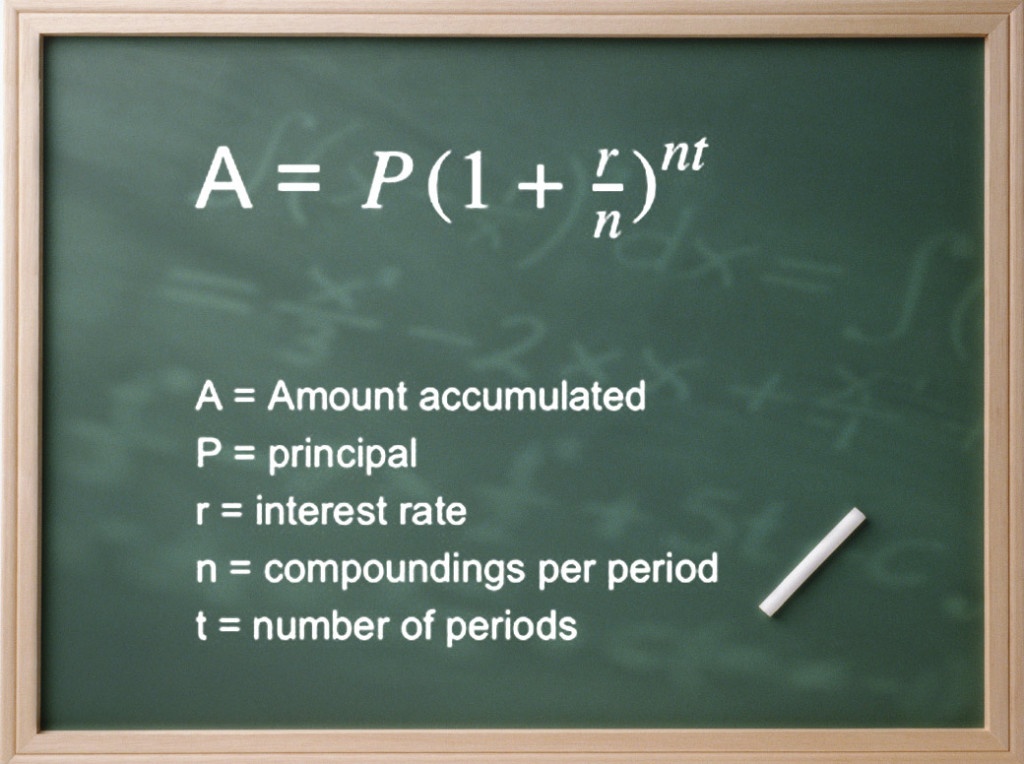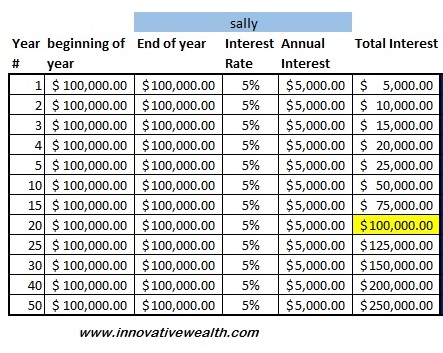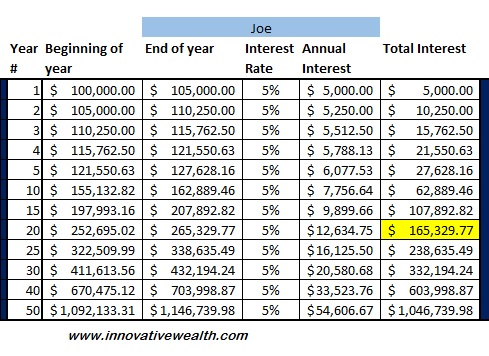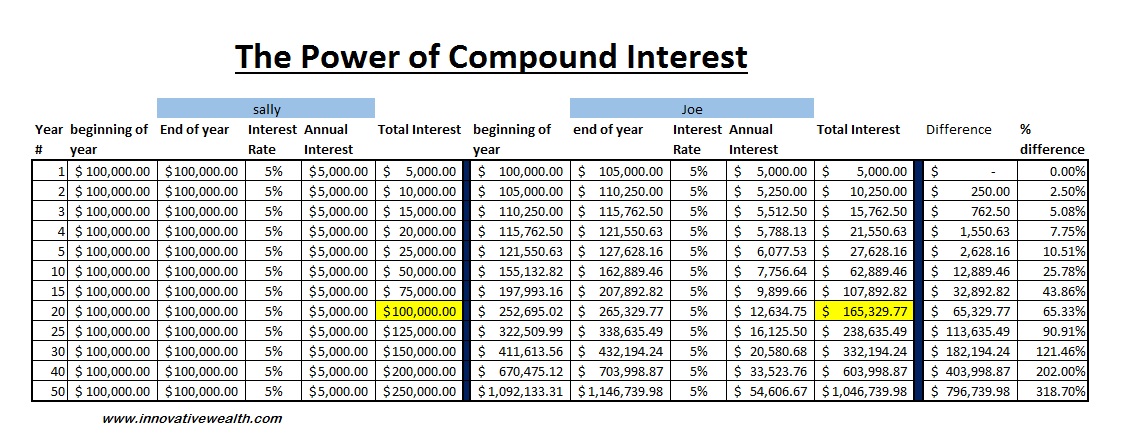“Compound interest is the most powerful force in the universe.” – Albert Einstein
I have heard this quote many times over the years. I, like most people, have just assumed that Albert Einstein said it since it is so widely attributed to him. However, when I looked it up, I realized that it may be just another urban myth. This can be added to my list of misquotes, false quotes, and misattributed quotes. There is no context for his quote or specific mention in writing of which he has made it. Then I found this picture online and felt there could be no better one to add to this post.

Regardless of whether he said it or not, it is a very important concept to understand.
Compound Interest
The term compound interest refers to the idea of taking the interest earned from an investment and rolling it back into the original investment to earn more interest in the following period of time. For example let’s say there are 2 investors, Joe Investor and Sally Saver. Joe Investor compounds his interest and Sally Saver does not. In these examples, both people start with $100,000 and have an interest rate of 5%. Both investors are years away from retirement and are looking to maximize their return for when they retire.
Simple Interest earned and not reinvested
Sally Saver decides to take her $100,000 and deposit it in a bank CD paying 5% interest annually. She expects to make $5,000 annually in interest off of her original investment of $100,000. In year one, Sally would earn $5,000 on her $100,000. In year 2, Sally would earn $5,000 on her $100,000. In year 20 Sally would earn $5,000 on her $100,000. Sally earns the same amount of interest each year which she has the money in the same CD earning 5%. The total interest earned on Sally’s investment over 20 years would equal $100,000. That $100,000 plus her original $100,000 equals a total amount of $200,000 at the end of the 20 years.
Compare this to Joe Investor who does reinvest his interest at the end of each year.
Compound Interest earned and reinvested
Joe Investor takes his $100,000 and also invests it in a bank CD yielding 5%. This will pay him $5,000 per year in interest as well. Joe is a bit more financially savvy than Sally. While Sally is happy just getting her $5,000 annually interest, Joe decides that his money will work harder for him if he reinvests the funds back into the same 5% CD which his original capital is invested in. This is what is called compound interest. The idea is to take the earned interest and reinvest it to generate additional interest. This reinvestment produces a multiplier effect on the invested money.
Which is better? Compound interest or Simple Interest?
In year one, Joe earns $5,000 on his original investment of $100,000. This is the same as Sally, however, this is where the similarities end. In year two, Joe’s total of $100,000 plus his earned $5,000 equaling $105,000 would earn $5,250 in interest. Assuming this pattern continues, at the end of 20 years, Joe’s original investment of $100,000 would grow to $165,329.77. His interest earned in year 20 is $12,634.75, compared to Sally’s $5,000. This earned interest plus his original investment of $100,000 would give him a total of $265,329.77.
This gives Joe 65% or $65,329.77 more interest than Sally, based on just reinvesting his interest back into the CD. This is a powerful concept.
What if you don’t need to retire in 20 years?
If you don’t need to retire in 20 years and you decide to extend the time frame a bit more, the differences are more pronounced:
- In year 25, Joe will earn $113,635.49 more interest than Sally. This is a difference of 90.91%
- In year 30, Joe will earn $182,194.24 more interest than Sally. This is a difference of 121.46%
- In year 40, Joe will earn $403,998.87 more interest than Sally. This is a difference of 202%
- In year 50, Joe will earn $796,739.00 more interest than Sally. This is a difference of 318.7%
Just by making a small change in what happens to the interest once it is received. The total amount of Joe’s investment will be worth more than $1,000,000. Whereas Sally Saver’s total investment would be worth only $250,000.
Do you think it is worth reinvesting the interest to make an extra 318.70%?
If the answer is yes, then please read my next article on how to make this concept of compound interest work for you in other investments. This article is the first in a six(6) part series about dividends. The next article is, Dividend Stocks – This one secret could significantly increase your returns with one quick phone call.
If you liked this article but felt that compounding is too slow and you want to find a faster way to compound your interest, then you should read the third article in the series, “If your dividend stock has this one thing, your could exponentially increase the returns from that investment.” Learn the secrets of the world’s wealthiest investors without getting a masters degree in finance. If you like these articles and want to stay up to date with our most recent blog posts, contact us to subscribe.
About Innovative Advisory Group: Innovative Advisory Group, LLC (IAG), an independent Registered Investment Advisory Firm, is bringing innovation to the wealth management industry by combining both traditional and alternative investments. IAG is unique in that we have an extensive understanding of the regulatory and financial considerations involved with self-directed IRAs and other retirement accounts. IAG advises clients on traditional investments, such as stocks, bonds, and mutual funds, as well as advising clients on alternative investments. IAG has a value-oriented approach to investing, which integrates specialized investment experience with extensive resources.
For more information, you can visit www.innovativewealth.com
About the author: Kirk Chisholm is a Wealth Manager and Principal at Innovative Advisory Group. His roles at IAG are co-chair of the Investment Committee and Head of the Traditional Investment Risk Management Group. His background and areas of focus are portfolio management and investment analysis in both the traditional and non-traditional investment markets. He received a BA degree in Economics from Trinity College in Hartford, CT.
Disclaimer: This article is intended solely for informational purposes only, and in no manner intended to solicit any product or service. The opinions in this article are exclusively of the author(s) and may or may not reflect all those who are employed, either directly or indirectly or affiliated with Innovative Advisory Group, LLC.




